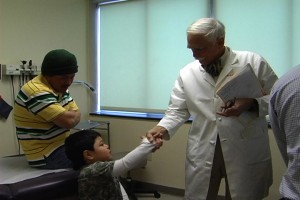 Manuel Guzman had been having persistent back pain, serious enough to keep him out of work. But with no health coverage he hadn’t been able to see a doctor and figure out what might be causing the problem.
Manuel Guzman had been having persistent back pain, serious enough to keep him out of work. But with no health coverage he hadn’t been able to see a doctor and figure out what might be causing the problem.
Until last month.
Guzman, who is 41, recently discovered The Rhode Island Free Clinic, which last year treated 2,000 patients who had no insurance and could not afford to pay for any health care.
“When you have nothing, you’re just out there. You don’t get care,” said Dr. Caroline Troise, who has been a volunteer at the free clinic since it was founded in 1999. Dr. Troise practices internal medicine at Anchor Medical Associates and has been the clinic’s volunteer medical director since 2001.
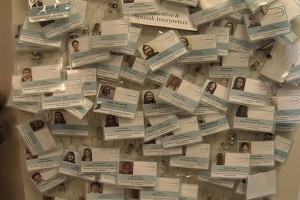 Over the past 15 years the clinic has grown into a million-dollar-a-year operation, privately funded through donations with no taxpayer money. More importantly, it leverages an additional $5 million of in-kind donations — everything from doctors to hospitals to supplies and contributions from nearly four dozens corporate donors.
Over the past 15 years the clinic has grown into a million-dollar-a-year operation, privately funded through donations with no taxpayer money. More importantly, it leverages an additional $5 million of in-kind donations — everything from doctors to hospitals to supplies and contributions from nearly four dozens corporate donors.
But this is no emergency room or urgent care center. The clinic operates like a doctor’s office, with patients scheduling regular appointments and getting care from specialists and medication as needed, but with no bill or co-pay at the end of the visit.
“We have a psychiatrist here, we have orthopedics, we have dermatology, we have GI doctors,” said Marie Ghazal, who has been the clinic’s CEO the past six years. “We raise every penny through the generosity of donors, companies and businesses.’’
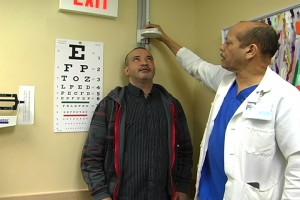 Over the past decade the clinic moved up to the third floor of a building on Broad St in South Providence and word has traveled through the medical community about the effect the organization is having on some of Rhode Island’s most vulnerable residents. More than 100 medical professionals, including doctors and nurse practitioners, volunteer their time here.
Over the past decade the clinic moved up to the third floor of a building on Broad St in South Providence and word has traveled through the medical community about the effect the organization is having on some of Rhode Island’s most vulnerable residents. More than 100 medical professionals, including doctors and nurse practitioners, volunteer their time here.
“Over the years we’ve been able to move to a larger space, we have state-of-the-art equipment here, we have an ophthalmology room,” Dr. Troise said. “We have a whole (variety) of specialists who are willing to take patients for free. If somebody needed neurosurgery, we have a neurosurgeon who will donate his time and expertise for free.’’
In 2012, CVS Health began providing medication free of charge to clinic patients. Dr. Troise says the partnership has been a significant turning point for the organization, which used to have its own pharmacy, but the donated pharmaceuticals weren’t always consistent or available.
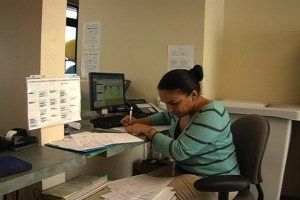 “A large number of our patients have diabetes and hypertension, so it’s really important that we have a supply of medicine that we can give patients,” Dr. Troise said. “The demand was so great that we couldn’t handle all of it and that was when CVS stepped in to provide free medication to our patients. Now if I prescribe a medication for blood pressure, that patient can have it for however long he’s on that medication.”
“A large number of our patients have diabetes and hypertension, so it’s really important that we have a supply of medicine that we can give patients,” Dr. Troise said. “The demand was so great that we couldn’t handle all of it and that was when CVS stepped in to provide free medication to our patients. Now if I prescribe a medication for blood pressure, that patient can have it for however long he’s on that medication.”
For the volunteer doctors there is an added bonus they don’t often see in their own practices.
“As a primary care doctor in practice now, it’s very frustrating because of all of the things you have to juggle in the office,” Dr. Troise said. “A large part of time is spent on non-medical things, non-doctor things like insurance companies, pharmacies, trying to get you to change medications. That’s one of the things I find even after a long day at the office. When I come here all I need to think about is taking care of my patient. I don’t have to worry if he’s going to be able to afford a medication. [I don’t wonder] where I’m going to get the test done, do I have to get authorization from the insurance company to order this test?”
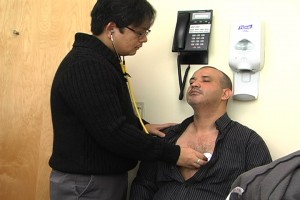 Ghazal says the Affordable Care Act has allowed hundreds of the free clinic’s patients to obtain medical coverage elsewhere, opening up spots for new patients over the past year. She said with all the talk about improving the state’s economy and bringing jobs to Rhode Island, many overlook the critical role healthcare plays in that formula.
Ghazal says the Affordable Care Act has allowed hundreds of the free clinic’s patients to obtain medical coverage elsewhere, opening up spots for new patients over the past year. She said with all the talk about improving the state’s economy and bringing jobs to Rhode Island, many overlook the critical role healthcare plays in that formula.
“If we have a healthy economy, then healthy Rhode Islanders can work and can take care of their families.”
If you want to see the video version of this story, go to RhodeIslandSpotlight.org. If you know of a person or organization who you think deserves the Spotlight, send an email to jim@RhodeIslandSpotlight.org.
